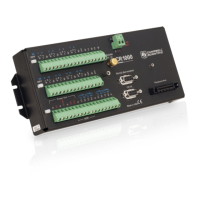path="CPU:"
size="50000"
last_write="yyyy-mm-ddThh:mm:ss.xxx"
run_now="false"
run_on_power_up="false"
read_only="false"
paused="false" />
<file
is_dir="false"
path="CPU:lights-web.cr1"
last_write="yyyy-mm-ddThh:mm:ss.xxx"
size="16994"
run_now="true"
run_on_power_up="true"
read_only="false"
paused="false"/>
</ListFilesResponse>
JSON Response
When json is entered in the ListFiles format parameter, the response will be
formated as CSIJSON
(p. 90). Following is an example response.
{
"files": [
{
"path": "CPU:",
"is_dir": true,
"size": 50000,
"last_write": "yyyy-mm-ddThh:mm:ss.xxx",
"run_now": false,
"run_on_power_up": false,
"read_only": false,
"paused": false
},
{
"path": "CPU:lights-web.cr1",
"is_dir": false,
"size": 16994,
"last_write": "yyyy-mm-ddThh:mm:ss.xxx",
"run_now": true,
"run_on_power_up": true,
"read_only": false,
"paused": false
},
]
}
8.6.3.14.12 File Management — NewestFile Command
NewestFile allows a web client to request a file, such as a program or image, from
the host CR1000. If a wildcard (*) is included in the expression, the most recent
in a set of files whose names match the expression is returned. For instance, a
web page may be designed to show the newest image taken by a camera attached
to the CR1000. NewestFile takes the form:
http://192.168.13.154/?command=NewestFile&expr=drive:filename.ex
t
Where filename can be a wildcard (*).
449

